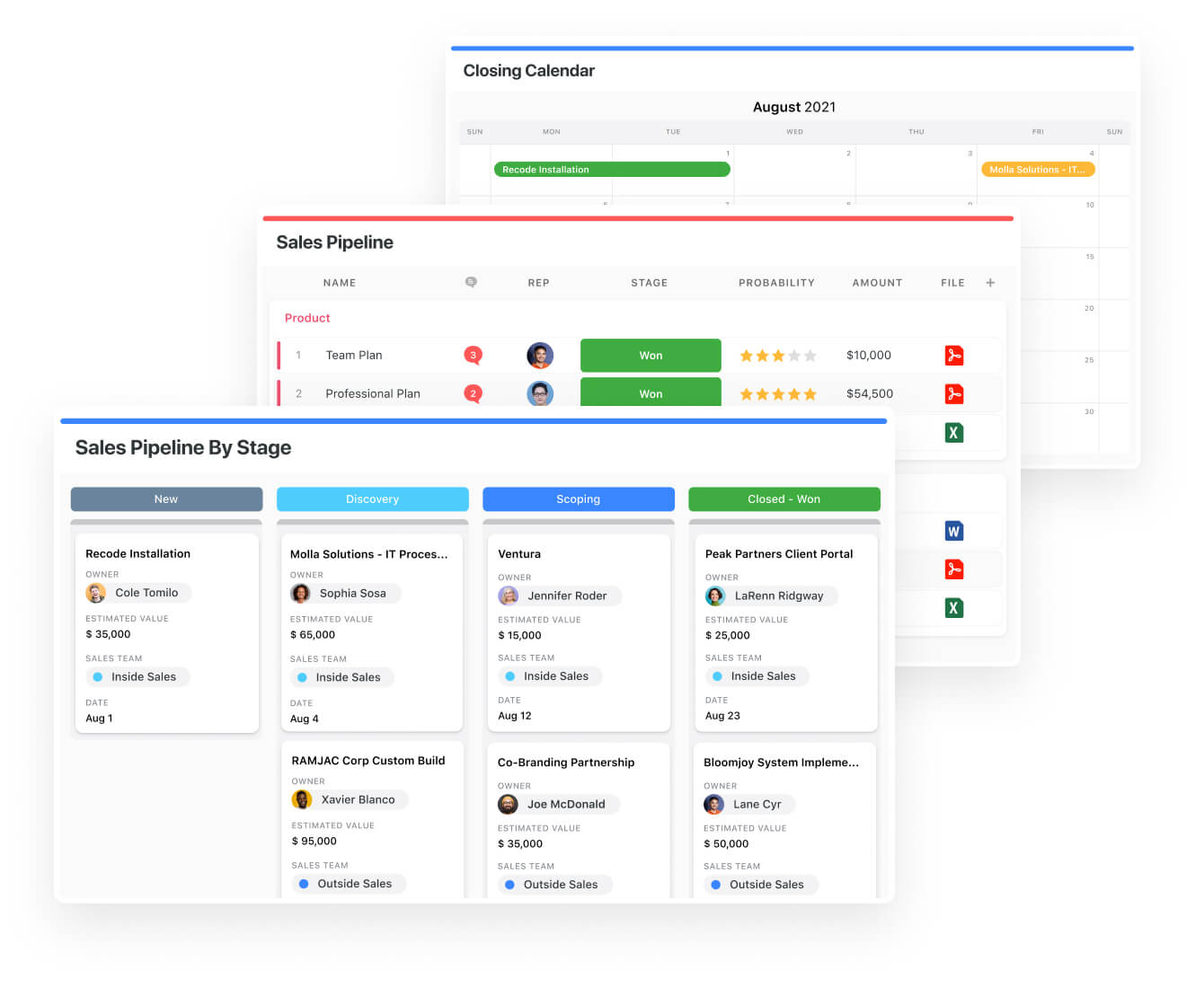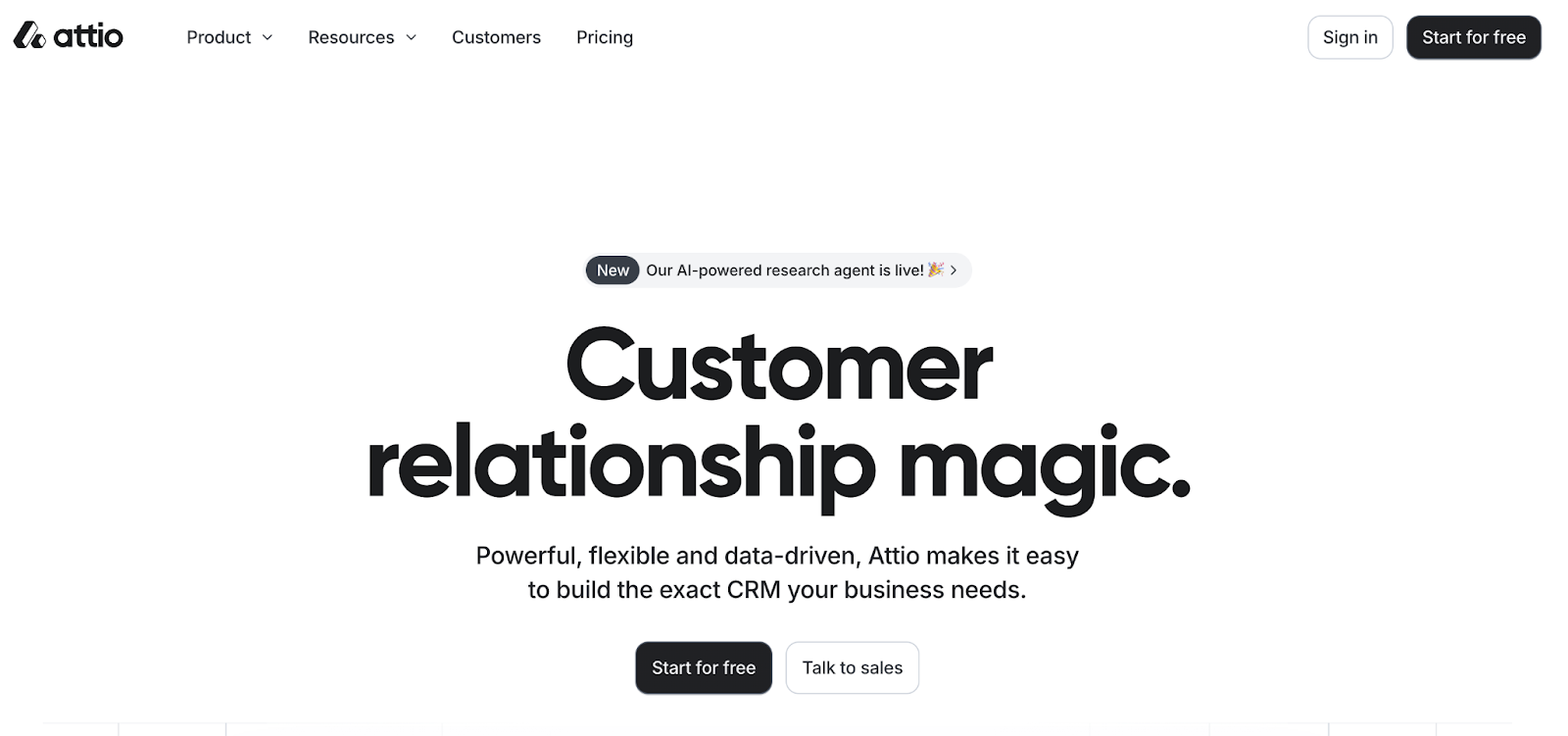HubSpot has long been a go-to solution for businesses seeking a comprehensive CRM. Its powerful features and extensive integrations have made it a popular choice for companies of all sizes.
While HubSpot shines in many areas, it has its limitations.
One of the most notable is the pricing structure, which quickly becomes expensive as your business grows. Close behind are the siloes that HubSpot creates when it comes to task management and workflow automation across teams.
This leads HubSpot customers to explore alternatives that suit their needs and budget constraints.
After analyzing hundreds of customer reviews and thoroughly testing various CRM tools, we've compiled a list of the top 9 best Hubspot alternatives.
We'll delve into each tool's key features, pricing plans, strengths, and drawbacks to help you find the best CRM. Our choices span traditional CRM systems like Salesforce to modern work platforms like SmartSuite and Monday.
Let’s look into it 👇🏼
Why Do Users Look for Hubspot Alternatives?
Hubspot shines as an all-in-one packaged solution for the marketing and sales team. It’s an amazing solution that is both easy to use and powerful. Especially within tech companies, it has become the #1 CRM option.
Since a single platform offers everything your sales and marketing teams need, processes and collaboration become smoother and less time-consuming.

Despite such a comprehensive toolkit, Hubspot falls short in some key areas:
Reason 1: Pricing quickly sneaks up on you
Hubspot's free plan is a good starting point, but essential features like sales automation, analytics, and account overviews are gated to paid plans.
And, if your business expands (which it’s bound to), the tool’s add-on costs will quickly catch up with you.

Reason 2: Limited reporting capabilities
HubSpot’s extensive feature set can sometimes be overwhelming, making it difficult to interpret reports and predict outcomes accurately.
Many users have complained about having more questions than answers despite having access to a wealth of data. This can be an issue for scaling organizations or non-sales functions that need visibility into go-to-market activities.

Reason 3: Basic automation on small-tier plans
Hubspot’s automated workflows are limited for teams on their low-tiered plans. The advanced automated workflows are available on a high-tier plan starting at $800/month, making users shift to look for a more affordable tool with powerful features.
💡 Another thing to note is that the go-to-market model is changing. With product-led growth on the rise, non-sales or marketing functions are now involved with revenue activities, which forces some HubSpot customers to look for function-agnostic platforms.

Husbpot’s overwhelming range of features and confusing and expensive plans make small and medium-sized businesses look for its alternatives.
What Are the Best Alternatives to Hubspot in 2024?
Based on our research and user reviews, these are the best Hubspot alternatives:
#1. SmartSuite
SmartSuite is a comprehensive workflow management platform that lets you manage your sales processes—lead generation, outreach, qualification, and communication, in a centralized workspace with built-in automation, task management and a company-wide collaboration.

Full disclosure: Even though SmartSuite is our own product, we aim to provide an honest perspective on why SmartSuite is the top Hubspot alternative available.
SmartSuite ranked first due to its feature-rich, affordable pricing plans, CRM automation, and advanced reporting.
Let's see some of SmartSuite's key features that make it the best contender against Hubspot.
Feature 1: Project management for sales and marketing
SmartSuite’s dynamic project management feature lets you build a custom campaign tracker or CRM tool to manage and track your workflows.
- Campaign management
Plan, build, and manage multiple campaigns in a dedicated dashboard—social media campaigns, product launches, content planners, and more.
You get access to 7+ task views including Gantt charts and Kanban board and get a deeper look into the campaign's performance.

- Project reporting and testing
Generate a detailed dashboard to review performance across various projects. Run A/B test campaigns to make data-driven decisions to improve project’s and team’s performance.

- Lead tracking
Convert more leads into buyers by tracking every aspect of their journey. By building a lead tracking dashboard, you can add as many properties as you need to get a granular view of the incoming database. To keep your team involved, you can share updates within the dashboard to facilitate quick and real-time communication.

- Pipeline & forecast reports
Convert your sales pipeline into visual graphs and charts to make forecasts and identify potential sales opportunities

Feature 2: Workflow automation
Smartsuite offers a robust workflow automation suitable for the sales and marketing team to accomplish various tasks ranging from lead generation to deal closing.
The no-code builder makes it easier for anyone in the team to build simple to complex workflows for various use cases.

Here are some of the use cases of SmartSuite’s workflow automation:
- Centralized marketing hub: Centralize all your marketing processes in a single platform from ideation to execution. With the no-code builder, you can automate repetitive tasks such as adding new leads to the CRM or updating new customer information, to speed up approval workflows.
- Campaign management: Manage outreach campaigns by setting up automation such as updating target leads status based on predefined criteria.
- Sales pipeline management: Update and manage sales databases and spreadsheets and ensure the database is updated all the time. This can include exporting leads to specific product or marketing lists and organizing tasks into actionable steps.
- Lead management: Set up notification triggers to send timely alerts to the right team members when new leads enter the sales funnel. This ensures that no lead is overlooked and that follow-up actions are timely.
Try setting up an automation below 👇
Feature 3: CRM template library
SmartSuite offers ready-to-use CRM templates to help you cut down on building one from scratch. Each template contains must-have fields such as accounts, lead type, qualification stage, and more.
For example, the Sales CRM template comes with accounts, contacts, opportunities, and sales resources tables, which serve as a central repository for each type of item. Some common use cases of these templates:
- Track estimated value of sales opportunities: Track the estimated and actual contract values of sales opportunities associated with an account.

- Rollup fields to calculate the total contract value: With the Sales CRM solution, multiple records of sales opportunities can be paired with a single account to generate a total contract value. Each opportunity's actual contract value is recorded, and the overall contract value is totaled in the Rollup field of the account table.

How Does SmartSuite Compare to Hubspot?
SmartSuite wins over Hubspot with its feature-packed and transparent pricing plans, which include rule-based automated assignments, lead management, and advanced reporting capabilities.
HubSpot is a great pick for centralizing all sales and marketing work into one platform and managing things like email marketing and social media.
The platform is accessible and easy for small and medium-sized businesses that don’t need too much volume or automation.
SmartSuite is the best choice if you want a system of record, task management, workflow automation, and cost scalability in one intuitive platform.
SmartSuite Pros and Cons
✅ Generous free plan with access to advanced features
✅ 200+ CRM templates for sales and marketing
✅ Flexible and advanced reporting,$ such as pipeline and sales forecast reports
✅ Intuitive no-code automation to streamline sales workflows
❌ Only 25+ integrations

#2. Salesforce
Best for: Building highly customizable AI-powered sales and marketing solutions
Similar to: Pipedrive and HubSpot

Salesforce is an advanced enterprise-level CRM that helps you manage your contacts, leads, processes, and analytics. Its AI-powered feature, Einstein, adds more power to the tool by offering real-time analytics, forecasting, and collaboration.
Hubspot and Salesforce compete head-to-head, but although Salesforce is not as intuitive and affordable as HubSpot, it’s the best choice if you need a highly customizable solution at scale.
Who Is It For?
Medium to large enterprises who want a CRM solution with extensive customization.
Salesforce’s Top Features

- Customization and integration: Highly customizable with the ability to integrate with a wide range of third-party applications through AppExchange.
- AI-powered insights: Salesforce native AI-powered tool, Einstein, provides AI-driven insights and analytics to enhance decision-making.
- Comprehensive reporting and analytics: Offers advanced reporting tools and customizable dashboards for in-depth analysis of sales performance.
Salesforce’s Pricing
Salesforce offers a 30-day free plan for its five pricing tiers:
- Starter suite: Starts at $25 per user/month, including account, contact, lead, and opportunity management and customizable reports and dashboards.
- Pro suite: Starts at $100 per user/month, including customer overview, mass emailing, and sales forecasting.
- Enterprise: Starts at $165 per user/month, including advanced forecast & pipeline management, conversation insights, and quote creation & tracking.
- Unlimited: Starts at $330 per user/month, including lead scoring and advanced integrations.
- Einstein 1 sales: Starts at $500 per user/month, including all the advanced features.
Salesforce's advanced features are available at a lower per-user cost compared to HubSpot's higher-tier plans.

Salesforce’s Pros and Cons
✅ 1000+ integrations including Tableau and Mulesoft
✅ Highly customization solution that fits your business need
❌ No free plan
❌ Expensive pricing plans not suitable for teams with a small budget
#3. Pipedrive
Best for: End-to-end management of sales processes
Similar to: Zoho CRM and Salesforce

Pipelive is an easy-to-use CRM tool that helps sales reps organize, manage, and track lead databases with advanced automation, reporting, and native communication tools.
Pipedrive is a great Hubspot alternative for sales teams as all the features are laser-focused on enhancing sales workflows at budget-friendly pricing.
Who Is It For?
Small to medium-sized businesses, entrepreneurs, and startups.
Pipedrive’s Top Features

- Automation workflows: Automate administrative and repetitive tasks such as sales call scheduling and email outreach.
- Native email inbox: Reach out to leads, manage your communication, and analyze email’s performance all with your CRM.
- Focus ‘Workday’: Place all your tasks in a dedicated space, giving you real-time visibility into your to-dos.
Pipedrive’s Pricing
Pipedrive offers five pricing plans with a 14-day free trial for each one of them:
- Essential: Starts at $24 per user/month, including customizable pipeline, 15 reports per user, and leads inbox.
- Advanced: Starts at $44 per user/month, including 30 active automation per user, two-way email sync, and email open & click tracking.
- Professional: Starts at $64 per user/month, including contract timeline, advanced automation, and revenue forecast reports.
- Power: Starts at $79 per user/month, including project add-on, 15 teams per company, and custom fields.
- Enterprise: Starts at $129 per user/month including unlimited reports and advanced customizations.
The pricing plans offered by Pipedrive are more scalable than Hubspot's without adding excessive costs.

Pipedrive’s Pros and Cons
✅ 400+ integrations
✅ Affordable, feature-packed pricing, especially for teams with small budget
✅ Excellent add-ons for marketing & lead generation
❌ Limited workflow customization
❌ Add-ons can be expensive
❌ Can’t handle complex processes
#4. Attio
Best for: Customizable CRM dashboard with data enrichment capabilities
Similar to: Monday.com and Pipedrive

Attio is a low-investment Customer Relationship Management (CRM) software that helps you track and optimize your business relationships with individuals and organizations.
Unlike Hubspot’s comprehensive CRM tools, Attio stands out with its limited, but robust feature pack including reporting and dashboard building.
Who Is It For?
Small to mid-sized businesses, startups, freelancers, and solopreneurs that need a lightweight, customizable CRM solution.
Attio’s Top Features

- Integrated communication: Share real-time updates, leave meaningful comments, and create templates to reduce repetitive workflow.
- Automation and workflows: Automate repetitive actions and collect actionable data points to improve your sales and marketing processes.
- Dynamic reporting: Transform data points into custom advanced reports to visualize progress and make data-driven decisions.
Attio’s Pricing
Attio’s free plan offers 3 seats, 100 workflow credits, and a limited email send limit/month. The paid plans come in three tiers:
- Plus: Starts at $34 per user/month, including 20 reports, and 200 credits to enrich contacts from LinkedIn and standard data sources.
- Pro: Starts at $69 per user/month, including unlimited emails, 2500 workflow credits, and up top 100 advanced reporting.
- Enterprise: Starts at $119 per user/month, including unlimited custom objects and 100+ reports.
Attio offers a 14-day free trial for its Pro plan only.
Attio's pricing is straightforward and per-user, with no additional onboarding fees, making it potentially more predictable for budgeting compared to HubSpot's higher-tier plans that include setup fees.

Attio’s Pros and Cons
✅ Automatic data enrichment
✅ Clean and blazingly fast UI
❌ Limited integrations
❌ Lack of native features such as email sequencing, lead scoring, and call tracking
#5. Monday.com CRM
Best for: Building appealing and customizable databases to manage all sales processes
Similar to: Folk and Attio

Monday.com CRM is part of Monday.com’s worksuite which helps sales teams build configurable pipelines dashboards. The tool stands out as it integrates with Monday.com’s work management software facilitating better collaboration with cross-functional teams.
Compared to Hubspot, Monday.com CRM stands out with its workflow automation and adaptable dashboard, which lets teams customize the look and feel of their lead generation processes.
Who Is It For?
Medium and large-size businesses who want a dynamic CRM tool or team who already uses Monday.com’s work management tool.
Monday.com CRM’s Top Features

- Dynamic data management: Import, merge, and create new databases in customizable databases that suit your lead qualification and management process.
- Centralized communication: Compose and sync emails, track their performance, and easily track contact-related activity.
- Automation: Automates repetitive tasks such as lead assignments, email notifications, and activity reminders.
Monday.com CRM Pricing
Monday.com offers a 14-day free trial and a free plan for up to 2 users. Their paid plans need at least 3 users and come in four tiers:
- Basic: Starts at $21 per user/month, including unlimited customizable pipeline, Whiteboard collaboration, and two-factor authentication.
- Standard: Starts at $28 per user/month, including Gmail and Outlook integration, 250 actions/month, and deal management.
- Pro: Starts at $48 per user/month, including private boards and docs, Google authentication,. Sales forecasting, and 100GB file storage.
- Enterprise: Salesforce integration, lead scoring, advanced analytics, and post-sales management. Contact sales for a quote.
Monday.com CMR beats Hubspot pricing with pricing as low as $21/month making it a suitable choice for smaller team size.

Monday.com CRM Pros and Cons
✅ Dynamic boards with multi-dashboard views
✅ Advanced and flexible automated workflows
❌ Requires a minimum team size to buy or upgrade plan
❌ Basic plan offers limited features
#6. Zoho CRM
Best for: Managing and tracking leads in a dedicated space with highly tailored dashboards and reports
Similar to: Salesforce and Pipedrive

Zoho CRM is a solid and budget-friendly CRM solution that offers extensive customization and integration capabilities. Its ease of use and affordability make it a compelling CRM choice for small and medium-sized businesses over Hubspot.
Who Is It For?
Small and medium-sized businesses with low budgets and enterprise teams looking to scale their CRM efforts.
Zoho’s Top Features

- Sales automation: Automates routine sales tasks, including sales appointment schedules, follow-up emails, contact tracking and lead scoring.
- Multichannel communication: Connect with your customer through multiple channels—email, phone, social media, and live chat to have more contextually rich conversations.
- Advanced analytics: Get insights into your sales pipeline with tools like Cohorts, custom reports, anomaly detectors, and funnels.
Zoho’s Pricing
Zoho offers a free plan for up to 34 users access and limited access to features including lead tracking, management, and basic reporting.
To explore what all Zoho has to offer, you can try its 15-day free trial for its four pricing tiers:
- Standard: Starts at $20 per user/month with access to sales forecasting tools, 100 custom reports, and 5 forms/modules.
- Professional: Starts at $20 per user/month with access to SalesSignals and unlimited customer reports and dashboard creation.
- Enterprise: Starts at $20 per user/month with access to Zoho AI and marketing attribution.
- Ultimate: Starts at $20 per user/month with access to 25 cohort analyses and access to advanced integration.
Zoho costs as little as one-third of HubSpot Sales Hub and offers a cost-effective CRM solution.

Zoho’s Pros and Cons
✅ Cost-effective pricing plans
✅ Preset reports and custom reporting capabilities
❌ AI assistance only available on Enterprise and Ultimate tiers
#7. Freshsales
Best for: Sales teams focused on automating workflows and enhancing productivity
Similar to: Pipedrive and Zoho CRM

Freshsales is the CRM tool offered by Freshworks, focused on growing the sales pipeline with powerful AI assistance.
With features like pipeline management, sales visualization, and automation make it a go-to choice for sales reps. On top of the powerful features, affordable pricing plans make it a great contender against Hubspot.
Who Is It For?
Startups and small to medium-sized businesses (SMBs) that need a cost-effective CRM solution
Freshsales’s Top Features

- Multi-channel communication: Engage with prospects at the right time in the right contextual setting across email, chat, phone, zoom, and SMSs.
- Automation: Build custom workflows and sales sequences by segmenting and prioritizing prospects based on rules and key identifiers.
- Deal management: Create and manage multiple sales pipelines in a custom setting to get a complete view of your sales process’s effectiveness.
Freshsales’s Pricing
Freshsales CRM offers a free plan for up to 3 users with basic CRM customizations, data import & export, and a built-in phone dialer. To get more advanced features, select from three pricing tiers:
- Growth: Starts at $11 per user/month, including 20 basic workflows, a visual sales pipeline, and Slack collaboration.
- Pro: Starts at $47 per user/month, including custom sales activities, 50 advanced automated workflows, and sales forecasting.
- Enterprise: Starts at $71 per user/month including a suite of advanced features to manage your leads and deals.
Freshsales offers more pocket-friendly entry-level pricing making it a much suitable choice for small to medium-sized businesses.

Freshsales’s Pros and Cons
✅ Affordable pricing tiers
✅ Highly customizable
✅ Integrates with Freshdesk, Freshteam, Freshmarketer, and Freshservice
❌ Integration marketplace not available for a free user
#8. Folk
Best for: Unifying contact management and nurturing relationships through dynamic pipelines and effective email campaigns.
Similar to: Pipedrive and Close CRM

Folk CRM is a relationship management software that helps teams manage their pipeline, communicate, and close deals in an easy-to-use platform.
Compared to Hubspot, Folk is built to help sales teams manage their contacts and relationships in a user-friendly interface.
Who Is It For?
Startups, small teams, and solopreneurs
Folk’’s Top Features

- Pipeline management: Define your deal stages, track deals, and identify your highly qualified leads, all in a customizable dashboard.
- Bulk email campaigns: Write, plan, and send ultra-personalized emails within Folk CRM and send in bulk using your domain.
- Unified contact management: Integrates with Gmail, Outlook, LinkedIn, Twitter, and more channels letting track conversation and outreach in a dedicated space.
Folk’s Pricing
Folk offers a 14-day free trial for its three pricing plans:
- Standard: Start at $25 per user/month, including pipeline management, 1/member email account sync, and integration with Zapier.
- Premium: Start at $50 per user/month, including custom objects, automation sequences, and migration services.
- Custom: Start at $100 per user/month to get custom features. Contact sales for a quote.
Folk's pricing is consistent across plans, while HubSpot's increases significantly with advanced features.

Folk’s Pros and Cons
✅ Adaptable and easy-to-navigate interface
✅ Chrome extension that works on every platform
✅ Native emailing tool
❌ Basic reporting and analytics capabilities
#9. Close
Best for: Building customer relationships through powerful native communication tools.
Similar to: Pipedrive and Salesforce

Close a sales-focused CRM built for the sales team to manage every aspect of their outreach, lead qualification, and deal closing.
Close CRM is an affordable and user-friendly alternative to HubSpot. It stands out because of its native calling system and automation.
Who Is It For?
A sales team of less than 100 who wants built-in functionality across multiple channels
Close’s Top Features

- Customizable pipelines: Get a granular view of your leads in the pipeline view. Customize the view by filtering or sorting based on the lead’s stage.
- Sales automation: Build multi-channel (SMS, phone calls, and emails) repeatable and scalable automated workflow to reach out to qualified leads, follow up with disengaged leads, and close highly qualified leads.
- Integrated communication: The platform includes tools for making phone calls, sending emails, and managing follow-ups, all from within the CRM, reducing the need for multiple tools.
Close’s Pricing
Close offers three pricing plans:
- Startup: Starts at $59 per user/month with 50,000 contact storage and 1 pipeline creation.
- Professional: Starts at $109 per user/month, including 500,000 contact storage and AI lead summaries.
- Enterprise: Starts at $149 per user/month, including unlimited lead and contacts storage with the option to create custom fields.
You can access all the plans with a 14-day free trial.
Close CRM offers built-in calling and SMS features, which are not available in HubSpot's basic plans.

Close’s Pros and Cons
✅ Intuitive and low learning curve
✅ Built-in channel for tracking and communication—Email + Global Calling + SMS + Video
❌ No free plan
❌ Limited marketing features and use cases
Next Step: Start Building Your Sales CRM
The alternatives we've discussed cater to various business sizes and needs.
If you are an enterprise-level organization and want extensive customization, tools like Salesforce or Zoho CRM would be ideal. For smaller businesses or startups looking for cost-effective solutions, Pipedrive, Attio, or Folk can be the go-to choices.
But, if you're seeking an adaptable, all-in-one CRM platform that offers a balance of powerful features, user-friendliness, and value for money, SmartSuite could be your best bet. With SmartSuite, you get to:
- Automate workflow with dynamic automation
- Manage your contacts and leads in an intuitive interface
- Improve team collaboration with native communication tools
- Predict sales closing and revenue through advanced analytics
Ready to explore further? Take SmartSuite for a spin or schedule a demo to talk to our sales team.
Read More
- The 10 Best Project Management Software For Engineers: We break down the top 10 project management solutions built with engineers in mind in 2025.
- Salesforce Alternatives: Learn about the 12 best Salesforce alternatives and why we included HubSpot there.
- 10 Best Healthcare Project Management Tools in 2025: Find out the best healthcare project management solutions on the market.
- 10 Best Enterprise Project Management Software: Find more about the best Enterprise-grade project management solutions on the market.
- 10 Best Project Management Software for Construction in 2025: A useful guide if you operate in the construction industry and you’re looking for a project management app.

Run your entire business on a single platform and stop paying for dozens of apps
- Manage Your Workflows on a Single Platform
- Empower Team Collaboration
- Trusted by 5,000+ Businesses Worldwide















